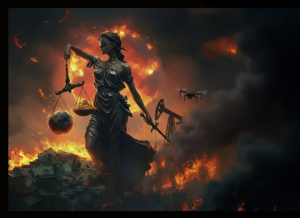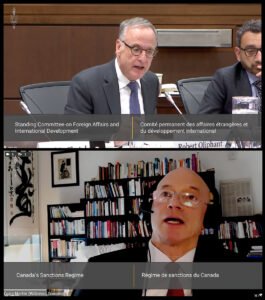 I have launched a new substack, entitled Law in Crisis, which some might find interesting. As the masthead explains, it is a forum for “musings on how law can help our response to crises, and how to respond to the crisis in law itself – use of force and armed conflict, climate change and security, AI and security, constitutional and int’l human rights, and the rule of law more generally.” The plan is to publish an essay of between one to two thousand words at least once a week.
I have launched a new substack, entitled Law in Crisis, which some might find interesting. As the masthead explains, it is a forum for “musings on how law can help our response to crises, and how to respond to the crisis in law itself – use of force and armed conflict, climate change and security, AI and security, constitutional and int’l human rights, and the rule of law more generally.” The plan is to publish an essay of between one to two thousand words at least once a week.
Canada
Speaking to the CBC on the Gaza Conflict
 I was pleased that the media is reaching out to international law scholars to get explanations of the legal issues raised by the conflict in Gaza, and was happy to speak with the CBC’s Canada Tonight show on the topic despite how fraught the issues are, but I found it difficult to provide the necessary nuance or really explain the complexity of any of these issues in the short time provided. It is pity that there is not sufficient time to lay out the issues in a little more depth and sophistication. Some other media, such as Ali Velshi’s spot on MSNBC, have taken a little more time with experts to explain some of these issues more fully. It is important for the public to understand these issues better.
I was pleased that the media is reaching out to international law scholars to get explanations of the legal issues raised by the conflict in Gaza, and was happy to speak with the CBC’s Canada Tonight show on the topic despite how fraught the issues are, but I found it difficult to provide the necessary nuance or really explain the complexity of any of these issues in the short time provided. It is pity that there is not sufficient time to lay out the issues in a little more depth and sophistication. Some other media, such as Ali Velshi’s spot on MSNBC, have taken a little more time with experts to explain some of these issues more fully. It is important for the public to understand these issues better.
Testifying on Economic Sanctions in the House of Commons, Standing Committee on Foreign Affairs
 It was an honor to invited to testify before the Standing Committee on Foreign Affairs and International Development in the Parliament of Canada’s House of Commons, on September 27, 2023, on issues relating to Canada’s economic sanctions laws, but I confess that the format was less than ideal. With each member of the committee allotted as little as five minutes for a question and an answer, it was really impossible to delve into the complexities of the issues being addressed, which was a real shame. My testimony was based on my report for policy makers on Economic Sanctions Under International Law, which was published in 2021.
It was an honor to invited to testify before the Standing Committee on Foreign Affairs and International Development in the Parliament of Canada’s House of Commons, on September 27, 2023, on issues relating to Canada’s economic sanctions laws, but I confess that the format was less than ideal. With each member of the committee allotted as little as five minutes for a question and an answer, it was really impossible to delve into the complexities of the issues being addressed, which was a real shame. My testimony was based on my report for policy makers on Economic Sanctions Under International Law, which was published in 2021.
Senate Testimony on Economic Sanctions
 I was invited to testify before the Senate of Canada, Standing Committee on Foreign Affairs, on issues relating to two pieces of legislation that form part of Canada’s economic sanctions laws. The full testimony can be found here (commencing half way through the full session), and a couple of clips of my answers to questions on the effectiveness of economic sanctions, and the lawfulness of secondary sanctions, were posted to YouTube by Senator Woo, and can be found here, and here. I was invited to testify in light of my report Economic Sanctions Under International Law: A Guide for Canadian Policy, published in 2021.
I was invited to testify before the Senate of Canada, Standing Committee on Foreign Affairs, on issues relating to two pieces of legislation that form part of Canada’s economic sanctions laws. The full testimony can be found here (commencing half way through the full session), and a couple of clips of my answers to questions on the effectiveness of economic sanctions, and the lawfulness of secondary sanctions, were posted to YouTube by Senator Woo, and can be found here, and here. I was invited to testify in light of my report Economic Sanctions Under International Law: A Guide for Canadian Policy, published in 2021.
